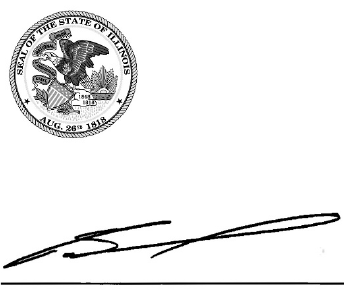
Page 1 of 22
(VER. 08/01/2023)
STATE OF ILLINOIS
HUMAN RIGHTS COMMISSION
ADMINISTRATIVE LAW SECTION
)
)
)
)
)
STANDING ORDER FOR ALL CASES FILED BEFORE THE
ADMINISTRATIVE LAW SECTION
This Standing Order will apply to all cases filed before the Administrative Law Section (“ALS”) of
the Illinois Human Rights Commission on or after August 1, 2023.
Upon the filing of a complaint before the ALS, a copy of this Standing Order will be provided to all
parties prior to their initial appearance before an administrative law judge. Attorneys and self-represented
litigants are expected to read this order and comply with its terms at all stages of proceedings. Failure to
adhere to the procedures set forth in this Standing Order may serve as grounds for an administrative law
judge to issue an appropriate sanction, up to and including the entry of an order for dismissal or default.
Parties who have questions about fulfilling the obligations set forth in this Standing Order are encouraged
to raise their concerns with the assigned administrative law judge.
As a further supplement and aid to this Standing Order, litigants are encouraged to review the
“Glossary of Terms Used in Commission Proceedings,” which is available on the website of the Illinois
Human Rights Commission at the following address: https://hrc.illinois.gov/process/glossary.html
Litigants who continue to have questions after reading this Standing Order and after reviewing the
information appearing on website of the Illinois Human Rights Commission are welcome to seek assistance
by phone at (312) 814-6269 (for cases before an administrative law judge in the Chicago Office) or at
(217) 785-4350 (for cases before an administrative law judge in the Springfield Office).
Page 2 of 22
(VER. 08/01/2023)
Table of Contents
1. NATURE OF PROCEEDINGS BEFORE THE ALS ...................................................................................................... 4
1.1: ALS Cases Are Lawsuits.................................................................................................................................................... 4
1.2: Ethics and Civility .............................................................................................................................................................. 4
2. THE ROLE OF THE ILLINOIS DEPARTMENT OF HUMAN RIGHTS (“DHR”) .................................................. 4
2.1: The DHR’s Role in Litigation ............................................................................................................................................ 4
2.2: The DHR’s Investigative Report and Findings .................................................................................................................. 5
3. LEGAL REPRESENTATION AND SELF-REPRESENTATION ................................................................................ 5
3.1: Qualified Representation .................................................................................................................................................... 5
3.2: Parties Appearing by Self-Representation.......................................................................................................................... 5
3.3: Corporations and Other Business Entities .......................................................................................................................... 6
3.4: Prior Appearances Before the DHR Constitute Appearances Before this Administrative Court ....................................... 6
4. PARTICIPATION IN COURT PROCEEDINGS ............................................................................................................ 6
5. JURISPRUDENCE AND GOVERNING LAW ............................................................................................................... 7
6. FILING PLEADINGS IN AN ALS CASE ........................................................................................................................ 7
6.1: Certificates of Service ........................................................................................................................................................ 7
6.2: Mechanics of Filing ............................................................................................................................................................ 7
6.3: Courtesy Copies of Pleadings ............................................................................................................................................ 8
7. APPEARANCES ................................................................................................................................................................. 9
8. INITIAL HEARINGS ......................................................................................................................................................... 9
9. INITIAL DISCLOSURES ................................................................................................................................................ 10
9.1: Definition and Timing ...................................................................................................................................................... 10
9.2: Complainant’s Initial Disclosures .................................................................................................................................... 10
9.3: Respondent’s Initial Disclosures ...................................................................................................................................... 11
10. DISCOVERY ................................................................................................................................................................. 12
11. MOTIONS ..................................................................................................................................................................... 12
11.1: Purpose and Content of Motions .................................................................................................................................... 12
11.2: Service of Motions ......................................................................................................................................................... 12
11.3: Statement of Meet-and-Confer ....................................................................................................................................... 13
11.4: “Noticing” Requirement of 56 Ill. Admin. Code § 5300.730(d) is Suspended .............................................................. 13
11.5: Timing of Response and Reply Briefs ........................................................................................................................... 14
11.6: Format and Length of Motions ....................................................................................................................................... 14
11.7: Courtesy Copies of Motions ........................................................................................................................................... 15
11.8: Motions to Compel Discovery ....................................................................................................................................... 15
11.9: Motions for Extensions of Time ..................................................................................................................................... 15
11:10: Motions to Strike .......................................................................................................................................................... 16
11:11: Direction to Act When Motions Become Ripe for Decision ........................................................................................ 17
12. REQUIREMENT TO SERVE THE ILLINOIS DEPARTMENT OF HUMAN RIGHTS .................................... 17
13. JUDICIAL SETTLEMENT CONFERENCES .......................................................................................................... 17
14. JOINT PREHEARING MEMORANDA .................................................................................................................... 18
Page 3 of 22
(VER. 08/01/2023)
15.
OBTAINING SUBPOENAS ........................................................................................................................................ 19
16. WARNING AGAINST FILING PERSONAL IDENTITY INFORMATION ........................................................ 21
17. WARNING AGAINST THE USE OF GENERATIVE ARTIFICIAL INTELLIGENCE..................................... 21
18. VARYING FROM THIS STANDING ORDER ......................................................................................................... 21

Page 4 of 22
(VER. 08/01/2023)
1. NATURE OF PROCEEDINGS BEFORE THE ALS
1.1: ALS Cases Are Lawsuits
In almost every way, appearing before an administrative law judge of the ALS is analogous to
appearing before a judge in a state or federal court. ALS cases are serious matters, and the decisions made
by our administrative law judges have the same force and effect as decisions rendered by the state and
federal courts of Illinois. For this reason, it is imperative that litigants who appear before the ALS
understand that they are participants in a lawsuit, and that this status requires them to follow the rules
governing practice before this administrative court.
In order of precedence, the rules governing practice before this administrative court are established
by: (a) the Illinois Human Rights Act, 775 ILCS 5/1-101 et seq.; (b) the procedural rules of the Illinois
Human Rights Commission, 56 Ill. Admin. Code § 5300.10 et seq.; and (c) this Standing Order. Failure to
comply with these rules is no different than violating a rule, order, or directive issued by a state or federal
judge.
1.2: Ethics and Civility
In addition to following the technical rules of this administrative court, litigants are advised that the
administrative law judges of the ALS expect all participants in pending cases to adhere to the highest
standards of ethics, civility, and professionalism when interacting with this administrative court or with any
opposing party. These standards are reflected in the Illinois Supreme Court Rules, of which Article VIII
contains the Illinois Rules of Professional Conduct. All parties—whether they are attorneys or not—are
expected to comply with the Illinois Rules of Professional Conduct in any proceeding or writing before this
administrative court.
In addition, in any ALS proceeding or filing, attorneys and parties are required to address each other
with mutual courtesy and respect. While this does not mean that litigants are prohibited from speaking
passionately about their cases (or advocating zealously on behalf of their clients), insults and other forms
of impertinent conduct are prohibited, and may result in the assigned administrative law judge issuing an
appropriate sanction. In all instances, parties are encouraged to remember the words of Former Associate
Justice of the United States Supreme Court Ruth Bader Ginsburg (the “Notorious R.B.G.”), who famously
observed: “You can disagree without being disagreeable.”
For their part, the administrative law judges of the ALS have pledged to conduct themselves in
accordance with Article XI of the Illinois Supreme Court Rules, which contains the Illinois Code of Judicial
Conduct. Among other things, the Illinois Code of Judicial Conduct mandates that all judges will perform
their duties in an impartial, competent, and diligent manner.
2. THE ROLE OF THE ILLINOIS DEPARTMENT OF HUMAN RIGHTS
(“DHR”)
2.1: The DHR’s Role in Litigation
Many litigants become confused regarding the role played by the DHR following the filing of a
complaint. Although Section 7A-102(D)(4) of the Illinois Human Rights Act entitles a complainant to

Page 5 of 22
(VER. 08/01/2023)
request the DHR to file a complaint on his or her behalf before the ALS, this is typically the end of the
DHR’s involvement in any ALS case. Complainants are advised that the DHR does not represent them as
legal counsel, nor does the filing of a complaint by the DHR suggest that a case before the ALS is presumed
to have legal merit. In all instances, a complainant in an ALS case must still prove liability and damages
by a preponderance of the evidence, regardless of any preliminary findings made by the DHR.
Once the DHR has filed a complaint before the ALS at the complainant’s behest, the complainant
immediately thereafter represents himself or herself in the resulting litigation, unless he or she elects to
retain independent counsel. This is true even in cases involving real estate transactions under Article 3 of
the Illinois Human Rights Act, where the DHR typically remains involved as a party. Even when the DHR
stays involved in a case, the agency does not represent the individual complainant as legal counsel, nor may
the litigant rely on the DHR to advance his or her unique and individualized legal claims.
2.2: The DHR’s Investigative Report and Findings
Parties routinely reference and attempt to introduce the underlying investigative report compiled by
the DHR as evidence in their ALS case. Complainants and respondents appearing before the ALS are
cautioned that the underlying investigative report compiled by the DHR is hearsay, and as such is generally
inadmissible as evidence in a proceeding or pleading before this administrative court. See In re Mitchell v.
Board of Education of the City of Chicago, ALS No. 14-0571, 2018 ILHUM LEXIS 994, at *7-8 (Apr. 5,
2018). While certain exceptions to this rule may apply, the parties need to be aware that any statements or
evidence summarized in the DHR’s investigative report must be independently introduced and properly
authenticated to be considered as evidence in a case pending before this administrative court.
Parties are advised that the assigned administrative law judge in an ALS case is not provided with
a copy of the DHR’s investigative report either before or after a complaint is filed. At the same time, parties
are advised that they must seek leave of this administrative court to compel an employee of the DHR to
testify regarding the contents of any files, documents, or reports (or the results of any underlying
investigation). See 56 Ill. Admin. Code § 5300.750(b)(4).
Parties to an ALS case should also be aware that the assigned administrative law judge is not
provided with a copy of any previous decision made by the Illinois Human Rights Commission in reference
to an earlier request for review action that challenged an investigative determination made by the DHR.
3. LEGAL REPRESENTATION AND SELF-REPRESENTATION
3.1: Qualified Representation
Parties may be represented in an ALS case by any attorney licensed to practice law in the State of
Illinois. Parties may additionally (or alternatively) be represented by any attorney that has been granted
permission to practice law in the State of Illinois before the Illinois Human Rights Commission pursuant to
Illinois Supreme Court Rule 707.
3.2: Parties Appearing by Self-Representation
Although individuals have a right to represent themselves in cases before the ALS, self-represented
litigants (sometimes referred to as “pro se” litigants) are at an extreme disadvantage in ALS proceedings,
and are strongly encouraged to retain an attorney to represent them before this administrative court.

Page 6 of 22
(VER. 08/01/2023)
Any litigant who chooses to be self-represented is reminded that Illinois law (rightly or wrongly)
requires this administrative court to hold the self-represented party to the same standards as a practicing
attorney. See Ammar v. Schiller, DuCanto & Fleck, LLP, 2017 IL App (1st) 162931, ¶ 16, 93 N.E.3d 660.
Available on the website of the Illinois Human Rights Commission are various informational
materials on organizations that have previously provided low-cost or pro bono (i.e., free) legal
representation to complainants in certain civil rights matters both here at the Illinois Human Rights
Commission and elsewhere. Litigants are advised that the State of Illinois in no way endorses or
recommends the services of any of these entities, nor does the State of Illinois verify, guarantee, or otherwise
vouch for the quality of legal representation that may be provided by any entity that agrees to provide low-
cost or free legal representation: https://hrc.illinois.gov/process/self-represented-litigants.html
Self-represented litigants are further advised that neither this administrative court nor the staff of
the Illinois Human Rights Commission can provide legal advice to any party in an ALS case.
3.3: Corporations and Other Business Entities
Corporations and other business entities are required to retain attorneys in ALS cases, as businesses
cannot represent themselves or appear in court pro se under Illinois law. See People ex rel. Schad v. My
Pillow, Inc., 2017 IL App (1st) 152668, ¶ 130, 82 N.E.2d 627 (citing Downtown Disposal Services, Inc. v.
City of Chicago, 2012 IL 112040, ¶ 22, 979 N.E.2d 50). Where a business lacks appropriate legal
representation, the assigned administrative law judge will order that business to retain an attorney. Where
a business entity refuses to retain an attorney notwithstanding the order of this administrative court, the
business entity may be subject to an appropriate sanction, including the entry of an order of default by the
assigned administrative law judge.
3.4: Prior Appearances Before the DHR Constitute Appearances Before this Administrative Court
Parties or attorneys who are served with a copy of a complaint filed in an ALS case are cautioned
that under the procedural rules of the Illinois Human Rights Commission, a prior appearance by a party or
attorney before the DHR constitutes an appearance before the Illinois Human Rights Commission under
most circumstances. See 56 Ill. Admin. Code § 5300.560(a).
4. PARTICIPATION IN COURT PROCEEDINGS
Parties and/or their legal representatives must attend scheduled hearings and other proceedings as
directed by this administrative court. Under the Illinois Human Rights Act, failure to appear at a court-
ordered hearing is an available basis on which the assigned administrative law judge may enter an order of
dismissal or default in an ALS case. See 775 ILCS 5/8A-102(I)(6). This authority is further incorporated
into the procedural rules of the Illinois Human Rights Commission, which authorize the assigned
administrative law judge to enter a sanction of dismissal or default (including attorneys’ fees) where a
party—through counsel or otherwise—fails to appear at a scheduled hearing or otherwise refuses to comply
with an order entered by this administrative court. See 56 Ill. Admin. Code § 5300.750(e).
Where a party cannot attend a scheduled hearing, that party should meet and confer with the
opposing party far enough in advance of the scheduled hearing to file a motion to continue the proceeding
(whether this relief is contested or not). Alternatively, if appropriate, a party that cannot attend a scheduled

Page 7 of 22
(VER. 08/01/2023)
hearing may authorize an opposing party to appear on behalf of all parties, but only where there is no
contested issue that needs to be resolved or addressed by the assigned administrative law judge.
5. JURISPRUDENCE AND GOVERNING LAW
The Illinois Human Rights Commission is created by Section 8 of the Illinois Human Rights Act.
See 775 ILCS 5/8-101 et seq. As such, in addition to its own 40-year history of publicly available case law,
the primary sources of guidance for the decisions rendered by the ALS are the laws and associated legal
precedents of the State of Illinois. While federal laws and judicial opinions that treat analogous questions
are often considered helpful, such sources are not binding on the ALS and may not be applicable where
legal standards differ under state and federal law. Accordingly, the parties should be sensitive not to
“federalize” the jurisprudence associated with the Illinois Human Rights Act.
Most historical decisions of the ALS are available on LEXIS-NEXIS by searching the abbreviation
“ILHUM” or by typing “Illinois Human Rights Commission Decisions” on the main search screen. For
litigants without access to LEXIS-NEXIS, decisions of the ALS dating back to 2006 are compiled on the
website of the Illinois Human Rights Commission under the “Decision Search” tab at the following link:
https://hrc.illinois.gov/decision.html.
6. FILING PLEADINGS IN AN ALS CASE
6.1: Certificates of Service
Any pleading filed in an ALS case must be submitted in PDF format, and must include a certificate
of service showing that the pleading has been delivered to all other parties in the case. The certificate of
service must show the identities of all parties to whom the pleading has been transmitted. In addition, the
certificate of service must indicate the date on which the pleading was transmitted to all other parties in the
case and the method by which it was sent (mail, fax, e-mail, personal service, etc.). The physical or
electronic addresses of all opposing parties must be reflected.
FAILURE TO INCLUDE A CERTIFICATE OF SERVICE WITH YOUR PLEADING IN AN ALS
CASE WILL RESULT IN YOUR PLEADING BEING WITHHELD FROM THE ASSIGNED
ADMINISTRATIVE LAW JUDGE UNTIL A COMPLIANT FILING IS SUBMITTED.
6.2: Mechanics of Filing
Pursuant to the procedural rules of the Illinois Human Rights Commission, see 56 Ill. Admin Code
§ 5300.40, there are currently three recognized methods for filing a pleading in an ALS case.
First, parties may file documents electronically in an ALS case by e-mailing copies of their
pleadings (in PDF format) to [email protected]. Parties may also fax copies of their pleadings to
(312) 814-6517. Electronic filing of a pleading that is either faxed or e-mailed is deemed complete on the
date the pleading is electronically submitted to the Illinois Human Rights Commission.
Second, parties may file documents in an ALS case by mailing them to the Illinois Human Rights
Commission at one of the following addresses:

Page 8 of 22
(VER. 08/01/2023)
FOR CASES BEFORE A JUDGE IN THE CHICAGO OFFICE:
Illinois Human Rights Commission
ATTN: Administrative Law Section
160 North LaSalle Street
Suite N-1000 (10th Floor)
Chicago, IL 60601
FOR CASES BEFORE A JUDGE IN THE SPRINGFIELD OFFICE:
Illinois Human Rights Commission
ATTN: Administrative Law Section
Jefferson Terrace
300 West Jefferson Street
Suite 108
Springfield, IL 62702
A pleading received by mail is considered filed on the date indicated in the certificate of service that
must accompany the pleading. As noted above, a certificate of service must be filed at the same time as the
pleading to which it refers. Parties are advised that service by mail is deemed complete four (4) days after
a document is properly addressed and posted for delivery to the person or entity that is to be served. See
56 Ill. Admin Code § 5300.30(c).
Finally, a party to an ALS case may file documents in person at either of the two offices of the
Illinois Human Rights Commission, the addresses of which are listed above. The hours of both offices are
from 8:30 a.m. to 5:00 p.m., Monday through Friday (except for state holidays). Parties are reminded that
pleadings filed in person must also include a certificate of service showing the information required in Sub-
Section 6.1 above (entitled “Certificates of Service”).
6.3: Courtesy Copies of Pleadings
Attorneys and self-represented litigants who file pleadings in an ALS case should refrain from
delivering multiple copies (or courtesy copies) of their pleadings to the Illinois Human Rights Commission.
When filing a pleading by mail or in person, please submit only one (1) original of your pleading to
the offices of the Illinois Human Rights Commission. Additional copies (or courtesy copies for the assigned
administrative law judge) should not be delivered.
When filing a pleading electronically, please do not submit or deliver corresponding paper copies
of the same pleading to the offices of the Illinois Human Rights Commission.
An electronic or scanned copy of any document filed with the Illinois Human Rights Commission
will automatically be provided to the assigned administrative law judge in each ALS case. Litigants who
file pleadings will subsequently receive file-stamped copies of their submissions via e-mail in response.
File-stamped copies of any earlier pleadings in an ALS case are available from the Illinois Human
Rights Commission upon request.

Page 9 of 22
(VER. 08/01/2023)
7. APPEARANCES
All individuals who intend to appear as advocates or parties in an ALS case must file a notice of
their appearance at the earliest possible opportunity. See 56 Ill. Admin. Code § 5300.560(a). This directive
applies regardless of whether a litigant is an attorney or a self-represented party. A fillable PDF entitled
“Appearance Form” is available for download on the website of the Illinois Human Rights Commission
under the “Rules and Forms” tab, which is immediately accessible at the following link:
https://hrc.illinois.gov/content/dam/soi/en/web/hrc/documents/appearance-form.pdf
As indicated on the Appearance Form, any individual who will appear before an administrative law
judge must have a current mailing address and e-mail address on file with this administrative court via an
up-to-date Appearance Form. It is the responsibility of each litigant to ensure that both a current mailing
address and a working e-mail address are on file with this administrative court in each ALS case to which
the litigant is a party or a party-representative.
Where a party fails to update or change mailing or e-mail address information through the
submission of an updated Appearance Form, this administrative court will continue to serve that party at
the previous mailing or e-mail address that appeared on the most recent version of the Appearance Form
that was filed with this administrative court. Where a party’s failure to update contact information results
in an electronic order or other correspondence from this administrative court being returned as
“UNDELIVERABLE,” such electronic order or other correspondence remains effective, and a subsequent
failure to comply with or respond to that electronic order or correspondence may result in an adverse ruling
(including dismissal or default).
8. INITIAL HEARINGS
Under the Illinois Human Rights Act, an initial hearing in an ALS case must be held between thirty
(30) and ninety (90) days after the Illinois Human Rights Commission has served the respondent with a
copy of the complaint. See 775 ILCS 5/8A-102(B). The initial hearing is conducted in accordance with
the procedural rules governing the Illinois Human Rights Commission, which (as noted above) are found
at 56 Ill. Admin. Code § 5300.10 et seq.
For good cause, any party may file a motion to continue the date of the initial hearing, although the
parties are cautioned that failure to attend the initial hearing without proper excuse may result in the
dismissal or default of the case (depending on which party fails to appear).
Ordinarily, the initial hearing in an ALS case is just a first-time status hearing to set a discovery
schedule and address other substantive and/or procedural issues that may arise in a particular matter.
However, the procedural rules of the Illinois Human Rights Commission contemplate the possibility that
the parties may wish to use their initial hearing to conduct a “public hearing” (i.e., a full trial) on the merits
of their case. This situation is rare, and requires the agreement of all parties to the case. Nevertheless, if
the parties wish to use their initial hearing as an opportunity to try their case, they must file a joint prehearing
memorandum at least twenty-one (21) days before their initial hearing. The required content of the joint
prehearing memorandum is set forth in Section 14 of this Standing Order (entitled “Joint Prehearing
Memoranda”). Further information on prehearing memoranda is also available under 56 Ill. Admin. Code
§ 5300.710.

Page 10 of 22
(VER. 08/01/2023)
When a joint prehearing memorandum is not timely filed before the initial hearing date, the assigned
administrative law judge will assume that the parties do not wish to use their initial hearing as an opportunity
to conduct a full trial of their case. A subsequent determination will be made by the assigned administrative
law judge—typically after the close of discovery—regarding when a trial will occur, and when any
associated joint prehearing memorandum will be due.
9. INITIAL DISCLOSURES
9.1: Definition and Timing
Upon the entry of a discovery schedule in an ALS case, the assigned administrative law judge will
set a date for the parties to exchange their initial disclosures. Initial disclosures include evidence and
information that each party is required to provide to all opposing parties in a case. In the absence of an
order from the assigned administrative law judge, the parties are required to exchange their initial
disclosures no later than sixty (60) days following the filing of an answer to the complaint by the respondent.
As noted below, the requirements for initial disclosures in an ALS case are different for complainants and
respondents.
Initial disclosures (and the evidence produced with them) should not be filed as pleadings in any
ALS case, although the parties should file a notice of service of their initial disclosures with this
administrative court.
9.2: Complainant’s Initial Disclosures
Within sixty (60) days of the respondent filing an answer to the complaint (or by whatever
alternative schedule is directed by the assigned administrative law judge), the complainant in any ALS case
must provide the respondent with the following information:
(a) a list of all individuals that the complainant believes are responsible for the civil rights violations
alleged in the complaint, and a brief description of how each individual is alleged to have
violated the complainant’s civil rights;
(b) a list of any witnesses that the complainant believes will prove his or her allegations of civil
rights violations;
(c) a list of all individuals that the complainant believes are similarly-situated, but who purportedly
received more favorable treatment from the respondent;
(d) if applicable, a description of the disability claimed by the complainant and the exact dates on
which the complainant both informed the respondent of this disability and requested any
reasonable accommodation;
(e) if applicable, a description of any and all protected activities in which the complainant allegedly
engaged, and the time, date, and manner through which the respondent became aware of such
protected activities;

Page 11 of 22
(VER. 08/01/2023)
(f) if applicable, a description of the discipline or adverse housing action to which the complainant
was subjected, the exact date(s) thereof, and the identity of any individual(s) responsible for
imposing such discipline or adverse housing action;
(g) a list and calculation of the damages the complainant is seeking, including numerical figures for
back pay, fringe benefits, emotional distress, and any other form of recovery (other than
attorneys’ fees) that the complainant might seek at trial; and
(h) complete copies of all of the complainant’s tax filings—including returns, attachments,
schedules, W-2s, 1099 forms, and any other supporting documents—that were previously
submitted to a state, federal, or local taxing authority for any fiscal or calendar year(s) for which
the complainant will seek damages from the respondent.
The complainant’s obligation to update and supplement initial disclosures remains ongoing
throughout the life of any ALS case.
9.3: Respondent’s Initial Disclosures
Within sixty (60) days of the respondent filing an answer to the complaint (or by whatever
alternative schedule is directed by the assigned administrative law judge), the respondent in any ALS case
must provide the complainant with the following information:
(a) if applicable, a complete copy of the complainant’s personnel file or employee personnel record;
(b) if applicable, a complete copy of the complainant’s application for tenancy or other preliminary
documents submitted to the respondent in support of a real estate or housing transaction;
(c) if applicable, a complete copy of any policies, rules, directives, orders, bylaws, employee
manuals, personnel codes, housing codes, or other governing instruments that the complainant
is alleged to have violated that led to discipline or other adverse action;
(d) if applicable, a complete copy of any non-privileged investigative report compiled by the
respondent (or any agent of the respondent) that pertains to conduct by the complainant that is
the subject of the complaint;
(e) if applicable, a list of all individuals who were subjected to discipline at or near the same time
as the complainant (and a description of the exact discipline to which each individual was
subjected);
(f) if applicable, a list of all other individuals who were subjected to the same adverse personnel
action that impacted the complainant; and
(g) a position description and/or organizational chart conveying the precise responsibilities and
supervisory status of any individual who has been accused of sexual harassment.
The respondent’s obligation to update and supplement initial disclosures remains ongoing
throughout the life of any ALS case.

Page 12 of 22
(VER. 08/01/2023)
10. DISCOVERY
Discovery in an ALS case is governed by the procedural rules of the Illinois Human Rights
Commission. See 56 Ill. Admin. Code § 5300.720 et seq. Ordinarily, the assigned administrative law judge
will set an initial period of approximately 4 to 5 months for discovery, although this timeframe may be
longer or shorter depending on the unique circumstances of a particular case. Prior to the time at which all
respondents are required to answer the complaint, no discovery may be conducted except by agreement of
the parties, or by leave of the assigned administrative law judge for good cause shown. See 56 Ill. Admin.
Code § 5300.720(b).
Parties to an ALS case are directed to file proof of mailing and service for all discovery requests
and responses with the Illinois Human Rights Commission. This ensures that the Illinois Human Rights
Commission has a memorialized record of all discovery that has been served and answered in each case.
However, parties should not file copies of their actual discovery requests and responses with this
administrative court, unless such filings are made in the context of a motion to compel discovery. See Sub-
Section 11.8 of this Standing Order (entitled “Motions to Compel Discovery”).
11. MOTIONS
11.1: Purpose and Content of Motions
Any party to an ALS case seeking a specific ruling or relief from this administrative court must
request such ruling or relief by filing a motion. Although parties are normally required to format their
motions in conformity with the guidelines set forth in Sub-Section 11.6 below (entitled “Format and Length
of Motions”), a fillable PDF for creating motions is also available on the website of the Illinois Human
Rights Commission at the following address:
https://hrc.illinois.gov/content/dam/soi/en/web/hrc/documents/motion-online.pdf
Motions filed with this administrative court should state the nature of the requested relief with
particularity, and should identify the relevant legal authority on which a party is relying to persuade this
administrative court to render a decision. Motions that fail to identify the legal basis on which a party is
requesting relief are subject to denial.
11.2: Service of Motions
Any motion filed in an ALS case must be served on all parties of record that have filed appearances
in the case. In other words, if a party files a motion with this administrative court, the party must
demonstrate that all other parties to the case have received a copy of the motion at the same time as this
administrative court. To ensure this occurs, any motion (or other pleading) filed in an ALS case must
include a certificate of service showing that the pleading has been delivered to all other parties. As
explained above in Section 6.1 (entitled “Certificates of Service”), the certificate of service must show the
identities of all parties to whom the motion has been delivered. In addition, the certificate of service must
indicate the date on which the motion was transmitted to all other parties in the case and the method by
which it was sent (mail, e-mail, personal service, etc.).

Page 13 of 22
(VER. 08/01/2023)
FAILURE TO INCLUDE A CERTIFICATE OF SERVICE WITH YOUR MOTION WILL
RESULT IN YOUR MOTION BEING WITHHELD FROM THE ASSIGNED ADMINISTRATIVE LAW
JUDGE UNTIL A COMPLIANT FILING IS SUBMITTED.
11.3: Statement of Meet-and-Confer
With the exception of motions to dismiss and motions for summary decision, any motion filed in an
ALS case must contain a statement confirming: (a) that the parties to the case discussed the relief requested
by the motion in person or by telephone before the motion was filed; and (b) that after good faith attempts
to resolve their differences in person or by telephone, the parties were unable to reach an agreement
regarding the relief requested by the motion.
CONTESTED MOTIONS THAT NEGLECT TO PROVIDE THE REQUIRED STATEMENT OF
MEET-AND-CONFER DESCRIBED ABOVE ARE SUBJECT TO PREEMPTIVE DENIAL BY THE
ASSIGNED ADMINISTRATIVE LAW JUDGE.
Where the parties are able to reach an agreement regarding the relief requested by a motion, the
word “UNOPPOSED” should appear in the title of any motion that is subsequently filed with this
administrative court requesting the relief to which the parties have agreed. Parties are advised that the
assigned administrative law judge is under no obligation to grant an “UNOPPOSED” motion merely
because the parties have agreed to the requested relief.
Where a party is unable to meet and confer with an opposing party in advance of the filing of a
motion, any motion that is subsequently filed must describe the reasons a meet-and-confer was not
conducted, and must explain why the failure to meet and confer was not attributable to the party filing the
motion.
Parties filing motions are cautioned that the failure to respond to e-mail—by itself—is not a
sufficient basis on which to claim that a moving party was unable to reach an opposing party in advance of
the filing of a contested motion. Evidence of attempts (plural) at in-person or telephonic communications
are further required.
Similarly, parties filing motions are cautioned that their motions may be denied where this
administrative court determines that an attempt at communication was either half-hearted or illusory (or in
any other way incongruent with the spirit of meet-and-confer that is envisioned by this sub-section). Such
disregard may occur, for example, where a moving party calls an opposing party late in the evening, only
to then file a contested motion under the theory that the opposing party was “unavailable” to meet and
confer. Such gamesmanship will not be tolerated in ALS cases, and may subject a party to an appropriate
sanction (including attorneys’ fees) for failing to conform to the standards of professionalism that are
expected of litigants who appear before this administrative court.
11.4: “Noticing” Requirement of 56 Ill. Admin. Code § 5300.730(d) is Suspended
Previously, a self-represented litigant or attorney who filed a motion in an ALS case was required
to file a notice of the date on which he or she intended to appear before the assigned administrative law
judge to set a briefing schedule for that motion. This practice was colloquially referred to as “Noticing”
the motion, and would often require the party filing the motion to contact the Illinois Human Rights
Commission to determine a date on which the assigned administrative law judge was already scheduled to

Page 14 of 22
(VER. 08/01/2023)
conduct status hearings in other cases. The obligations for “Noticing” a motion are currently set forth in
the procedural rules of the Illinois Human Rights Commission under 56 Ill. Admin. Code § 5300.730(d).
However, these obligations consistently created confusion for many litigants—principally because
the procedural rules of the Illinois Human Rights Commission appear to suggest that parties must visit the
Chicago office to schedule a hearing at which the notice of a motion will be heard.
To avoid this confusion, the ALS has indefinitely suspended its prior practice of “Noticing” motions.
Instead, when a party files a motion in an ALS case, a copy of that motion will immediately be provided to
the assigned administrative law judge. The assigned administrative law judge will then enter an order
setting a briefing schedule for the motion or enter an order directing the parties to appear at a subsequent
status hearing to discuss the motion. The assigned administrative law judge may also summarily rule on
the motion. The point is that once a motion is filed, only the assigned administrative law judge is required
to take further action. Neither party is required to “notice” the motion or otherwise appear, and all parties
will receive a copy of any associated order that is entered by the assigned administrative law judge.
For avoidance of doubt, this Sub-Section 11.4 applies only to the practice of “Noticing” motions,
and does not alter or change the procedures for filing motions before the Illinois Human Rights
Commission. Parties should continue to file motions in the manner prescribed by Sub-Section 6.2 of this
Standing Order (entitled “Mechanics of Filing”), and should ensure that proper certificates of service are
attached to their motions pursuant to Sub-Section 11.2 above (entitled “Service of Motions”).
11.5: Timing of Response and Reply Briefs
As noted above in Sub-Section 11.4, for any contested motion that is filed in an ALS case, the
assigned administrative law judge will enter an order setting a schedule: (a) for the opposing party to file
a response to the motion; and (b) for the moving party to file any necessary reply in support of the motion.
Alternatively, the assigned administrative law judge may enter an order directing the parties to appear at a
subsequent status hearing to discuss the motion. In either situation, the assigned administrative law judge
will set the briefing schedule and deadlines for any response or reply briefs associated with a contested
motion.
Where the assigned administrative law judge affirmatively declines to set a briefing schedule or
otherwise chooses not to enter a controlling order, the default period for opposing a motion will be governed
by the procedural rules of the Illinois Human Rights Commission. See 56 Ill. Admin. Code § 5300.730(b).
11.6: Format and Length of Motions
With the exception of any motions that are created using the fillable “Blank Motion Form” that is
available on the website of the Illinois Human Rights Commission, all contested motions filed in ALS cases
must be double-spaced, and must be written in 12-point font. All materials submitted to this administrative
court must be legible, with the relevant portions of all exhibits specifically identified.
Unless a party requests and receives approval from this administrative court in advance, no brief
filed in support of a motion may exceed fifteen (15) pages (exclusive of exhibits), nor may any brief
opposing a motion exceed the identical page limit (i.e., fifteen (15) pages – also exclusive of exhibits).
Parties should rarely require more room to concisely explain and justify the relief they require from this
administrative court.

Page 15 of 22
(VER. 08/01/2023)
11.7: Courtesy Copies of Motions
As explained in Sub-Section 6.3 above (entitled “Courtesy Copies of Pleadings”), attorneys and
self-represented litigants who file motions in an ALS case should refrain from delivering multiple copies
(or courtesy copies) of their pleadings to the Illinois Human Rights Commission.
When filing a motion by mail or in person, please submit only one (1) original of your motion to the
offices of the Illinois Human Rights Commission. Additional copies (or courtesy copies for the assigned
administrative law judge) should not be delivered.
When filing a motion electronically, please do not submit or deliver corresponding paper copies of
the same motion to the offices of the Illinois Human Rights Commission.
An electronic or scanned copy of any motion filed with the Illinois Human Rights Commission will
automatically be provided to the assigned administrative law judge in each ALS case. Litigants who file
motions will subsequently receive file-stamped copies of their motions via e-mail in response.
11.8: Motions to Compel Discovery
A party seeking to compel compliance with a discovery request may file a motion to compel
discovery. Attached as exhibits to the motion to compel discovery must be copies of the discovery requests
at issue, as well as copies of the corresponding discovery answers that are alleged to be deficient or
incomplete. Where a party seeking to compel discovery fails to attach copies of the underlying discovery
requests and answers that are the subject of the motion to compel, the motion to compel discovery may be
preemptively denied by the assigned administrative law judge.
In addition, any motion to compel discovery must state with particularity the specific information,
documents, evidence, or answers that are being sought for production from the opposing party. A
generalized argument that discovery responses are “vague” or “non-specific” is not a sufficient basis on
which to demand further production, nor may any party seek to enforce discovery requests that are overly
broad or unduly burdensome as a means of asserting litigation pressure on an opposing party. In all
instances, parties must be aware of the precise type or variety of information they are seeking to compel,
and must be prepared to explain to this administrative court why such evidence is relevant to the allegations
they are required to prove at trial.
11.9: Motions for Extensions of Time
Cases filed before the ALS are civil lawsuits, meaning that most deadlines directed by our
administrative law judges will afford the parties several weeks (if not multiple months) to comply with the
obligations that are imposed on them by this administrative court.
To the extent a party foresees an impending difficulty conforming to a deadline, that party should
communicate with the opposing party and this administrative court far enough in advance to allow the
assigned administrative law judge to assess the need for any requested extension of an applicable deadline.

Page 16 of 22
(VER. 08/01/2023)
To be sure, emergency circumstances can (and sometimes do) arise, and this administrative court
stands ready to be accommodating of parties whose ability to fulfill their professional obligations has been
frustrated through no fault of their own.
Yet notwithstanding the foregoing comment, “emergency circumstances” are among the most rare
and infrequent of reasons cited by parties for their requests to continue applicable deadlines. Most often, a
party has procrastinated in the need for action, only to thereafter file a motion for extension under the theory
that additional time will simply be granted by the assigned administrative law judge as matter of course.
Parties are hereby disabused of any such notion, as this administrative court does not view a lack of
diligence or initiative as a sufficient justification for the award of additional time in an ALS case.
Parties who file motions for extensions of time must identify good cause for the grant of any
requested extension. In making such requests, parties are advised that where a motion for extension of time
is filed on the same date as the deadline sought for extension, the assigned administrative law judge may
preemptively deny any such motion as “late” in the absence of emergency circumstances. At the same time,
where a motion for extension of time does not provide this administrative court with sufficient opportunity
to weigh and consider the proposed good cause that serves as the basis for the requested extension, the
assigned administrative law judge may similarly deny the motion without considering the underlying
request.
11:10: Motions to Strike
Motions to strike are strongly disfavored by this administrative court, as parties appear to be
perpetually confused regarding the proper purpose and scope of such motions.
A motion to strike seeks to preclude the assigned administrative law judge from considering the
contents of a particular pleading. However, all ALS cases are bench trials, meaning that the assigned
administrative law judge acts as both judge and “jury” (in the sense that he or she must make decisions
regarding both liability and damages). Ironically, therefore, a motion to strike actually requires the assigned
administrative law judge to focus more intently on the evidence that the moving party believes should be
excluded from review.
And yet, setting aside the practical irony of such motions, most parties fail to identify an independent
legal rationale for which a particular pleading should not be before this administrative court, opting instead
to point to evidentiary objections (such as hearsay) to claim that certain information should be disregarded.
Parties should be assured that the administrative law judges of the Illinois Human Rights Commission are
well-versed in the law, and do not require an additional or supplemental motion to flag when a party is
attempting to rely on evidence that is inadmissible.
As such, there should rarely be a reason for a party to file a motion to strike. Instead, parties who
are opposing pending motions should simply make arguments regarding the admissibility of specific
evidence in the body of their opposition briefs. No separate motion to strike is required, and this
administrative court will construe nearly all such motions as evidentiary objections that are incorporated
into a party’s opposition to a pending motion (unless an independent legal basis is asserted for the exclusion
of specific evidence).

Page 17 of 22
(VER. 08/01/2023)
11:11: Direction to Act When Motions Become Ripe for Decision
Parties are directed to file any contested motion as soon as an issue becomes ripe for decision.
Parties are further cautioned that this administrative court views litigation as a continuously narrowing
process, such that the failure of a party to raise an issue at the time it becomes ripe may later preclude that
party from raising the issue at a subsequent stage of proceedings (particularly where it is shown that the
party had ample opportunity to raise the contested issue but failed to do so for a significant length of time).
12. REQUIREMENT TO SERVE THE ILLINOIS DEPARTMENT OF HUMAN
RIGHTS
The procedural rules of the Illinois Human Rights Commission require that certain pleadings in
cases before the ALS must also be served on the Illinois Department of Human Rights (or “DHR”) to be
properly brought before the assigned administrative law judge. When filed with the Illinois Human Rights
Commission, the following pleadings (including proof of service thereof) must be served on all parties of
record and on the DHR:
(a) Answers and Affirmative Defenses (and any Supplemental Answers or Affirmative Defenses)
(b) Motions to Dismiss
(c) Responses and Replies to Motions to Dismiss
(d) Motions to Amend Pleadings
(e) Amended Pleadings
(f) Motions to Compel Illinois Human Rights Commission Employees to Testify
(g) Motions to Compel Illinois Department of Human Rights Employees to Testify
(h) Motions for Summary Decision
(i) Responses and Replies to Motions for Summary Decision
Service on the DHR may be accomplished by delivering copies of pleadings (either electronically
or physically) to the DHR at one of the following physical or electronic addresses:
Illinois Department of Human Rights
ATTN: Chief Legal Counsel
555 West Monroe
7th Floor
Chicago, IL 60661
Self-represented litigants are reminded that the DHR does not represent individuals in ALS cases
before the Illinois Human Rights Commission.
13. JUDICIAL SETTLEMENT CONFERENCES
A judicial settlement conference—i.e., a formal mediation conducted by an administrative law
judge—is typically available in an ALS case at any time, although two or more parties must agree to attend
a judicial settlement conference (and agree to participate in good faith) before any such meeting is
scheduled.

Page 18 of 22
(VER. 08/01/2023)
The parties to any ALS case are always encouraged to pursue settlement negotiations, either between
themselves or with the assistance of this administrative court. In support of these efforts, parties are invited
to visit the website of the Illinois Human Rights Commission for further information on judicial settlement
conferences. There, they will find both the Standing Order for Judicial Settlement Conferences and the
Checklist for Judicial Settlement Conferences, both of which may be useful to the parties in determining
whether a judicial settlement conference may be an effective means of resolving their dispute. Links to
both documents are below:
Standing Order for Judicial Settlement Conferences:
https://hrc.illinois.gov/content/dam/soi/en/web/hrc/documents/standing-order-for-judicial-settlement-
conferences.pdf
Checklist for Judicial Settlement Conferences:
https://hrc.illinois.gov/content/dam/soi/en/web/hrc/documents/checklist-for-judicial-settlement-
conferences.pdf
Parties who believe that a judicial settlement conference might be beneficial in their ALS case
should file a joint request for a judicial settlement conference with the assigned administrative law judge.
The joint request need not be long, but must identify all parties that are jointly requesting a judicial
settlement conference.
14. JOINT PREHEARING MEMORANDA
Pursuant to the procedural rules of the Illinois Human Rights Commission, see 56 Ill. Admin. Code
§ 5300.710(a), the purpose of a joint prehearing memorandum is to ascertain the positions of the parties,
and to reach agreements on stipulations of fact, admissibility of documents, and other matters that may
expedite the conduct of a public hearing in an ALS case. While all parties must sign any joint prehearing
memorandum that is filed with this administrative court, any party may volunteer to draft the initial version
of the pleading before providing a copy to all opposing parties for additions, revisions, and/or modifications.
As noted above in Section 8 (entitled “Initial Hearings”), in the rare circumstance where the parties
to an ALS case agree to use their initial hearing to conduct a public hearing (i.e., a full trial) on the merits
of their case, they must file a joint prehearing memorandum at least three (3) weeks before their initial
hearing. Alternatively, where the parties to an ALS case have proceeded through discovery and are now
preparing for a public hearing that has been scheduled by the assigned administrative law judge, they must
file a joint prehearing memorandum by whatever deadline has been set by the assigned administrative law
judge.
Where one or both parties fail to substantially comply with the directions for preparing a joint
prehearing memorandum, the assigned administrative law judge may apply any appropriate sanction,
including a recommendation of dismissal or default. See 56 Ill. Admin. Code § 5300.710(b).
The parties to an ALS case are required to include the following content in any joint prehearing
memorandum that is filed with this administrative court:
Page 19 of 22
(VER. 08/01/2023)
(a) the name, address, and telephone number of counsel for each party;
(b) a concise statement of the causes of action asserted by the complainant and the corresponding
defenses that will be asserted by the respondent;
(c) a single statement (in numbered paragraph form) of the uncontested facts in the case, including
a list of any stipulations of fact into which the parties have entered;
(d) a single statement (in number paragraph form) of the contested facts in the case;
(e) a statement of the issues of law relating to liability;
(f) an itemization of the damages and other relief sought by the complainant, including a summary
of attorneys’ fees and costs to date;
(g) a list of the names and addresses of all witnesses: (i) who will be called to testify; and (ii) who
may be called to testify;
(h) a list of the names and addresses of all witnesses whose depositions will be used at trial in lieu
of testimony;
(i) a list of the names of any expert witnesses who will be called to testify at trial;
(j) a summary of any party’s objections to the qualifications of an opposing expert witness;
(k) an identification (by letter, number, etc.) of any exhibits that may be introduced by either party
at trial (PLEASE NOTE: documents not listed in the joint prehearing memorandum will not be
admitted at trial);
(l) a list of all exhibits to which the parties have no objection to admissibility;
(m) a list of all exhibits to which there are objections to admissibility, including descriptions of such
objections and the legal grounds upon which either party is relying to assert its objections
(PLEASE NOTE: there is no right to “Reserve” objections before this administrative court);
(n) a statement on the expected length of the public hearing; and
(o) a statement summarizing the current status of settlement negotiations.
Parties to an ALS case are advised to follow any further instructions provided by the assigned
administrative law judge in advance of the preparation of their joint prehearing memorandum.
15. OBTAINING SUBPOENAS
A “subpoena” is a legal document issued by the Illinois Human Rights Commission that directs a
party (or a third party) to take a specific action in reference to an ALS case. There are three (3) types of
subpoenas that can be issued by the Illinois Human Rights Commission in an ALS case:

Page 20 of 22
(VER. 08/01/2023)
(a) Subpoena for Appearance – a “Subpoena for Appearance” is used to compel the appearance of
a party or a witness at a hearing;
(b) Subpoena for Documents – a “Subpoena for Documents” is used to compel the production of
any necessary records or documents from a party or a third party; and
(c) Subpoena Duces Tecum – a “Subpoena Duces Tecum” is used to compel other forms of action,
such as the appearance of a party or a witness at a deposition.
Parties may request subpoenas from the Executive Director of the Illinois Human Rights
Commission. See 56 Ill. Admin. Code § 5300.210. Such requests can be made in person, by
correspondence, or by e-mail (at HRC.News@illinois.gov). To obtain a subpoena, a party must provide
the following information:
(a) the exact number and type(s) of subpoena(s) requested;
(b) the identity of the party requesting the subpoena(s) (i.e., complainant or respondent);
(c) the ALS case number and the underlying charge number for that ALS case;
(d) the full name of the complainant; and
(e) the full name of the attorney or party requesting the subpoena(s).
Please note that while either the complainant or the respondent may request a subpoena, the Illinois
Human Rights Commission is not responsible for serving that subpoena. Instead, the party requesting the
subpoena is responsible for serving it on the party or third party to whom the subpoena is directed.
Subpoenas will be blank (but signed by a Commissioner of the Illinois Human Rights Commission)
when they are provided to the requesting party. The requesting party is thereafter responsible for accurately
and completely filling out the subpoena, including delivery information for the party to be served. The
requesting party is also responsible for providing any details necessary to comply with the subpoena, such
as the dates of any appearances or the description of any records that must be produced. Each subpoena
should reflect the entire case name, including the ALS case number and the underlying charge number for
that ALS case.
Once a subpoena is filled out accurately and completely, the party that requested the subpoena is
responsible for notarizing it. Only a notarized subpoena can be served on the party or third party to whom
the subpoena is directed.
Each subpoena is printed on carbon paper that includes multiple, color-coded copies. The proper
recipient for each color-coded copy of the subpoena is printed at the bottom of each page. When serving a
subpoena, the party that requested the subpoena is responsible for delivering the correct, color-coded copy
of the subpoena to the correct recipient. The proper copy of the subpoena must also be returned to the
Illinois Human Rights Commission and filed in the corresponding ALS case, along with a certificate of
service showing that the subpoena was served on the individual or entity named in the subpoena and all
other parties to that ALS case.
Page 21 of 22
(VER. 08/01/2023)
Parties are advised that the Illinois Human Rights Commission must account for every subpoena
issued. Accordingly, parties to an ALS case will only be issued the exact number of subpoenas requested
for each designated recipient of a subpoena. Extra subpoenas will not be provided to parties “just in case.”
16. WARNING AGAINST FILING PERSONAL IDENTITY INFORMATION
In any ALS case, parties are directed to refrain from including personal identity information in any
pleading, motion, exhibit, or other document that is filed with this administrative court. Pursuant to Illinois
Supreme Court Rule 138, “personal identity information” includes: (a) social security and/or individual
taxpayer-identification numbers; (b) driver’s license numbers; (c) financial account numbers; or (d) debit
and credit card numbers.
Any such personal identity information appearing in a pleading, motion, exhibit, or other document
that needs to be filed with this administrative court should be redacted to show only the last four (4) digits
of such personal identity information.
Where the submission of “viewable” personal identity information is necessary to sustain an
evidentiary burden or otherwise comply with the law, a party seeking to introduce personal identity
information must request and receive approval from this administrative court to file unredacted personal
identity information in advance of such filing. This administrative court—upon the grant of leave to file
personal identity information—will establish appropriate procedural safeguards to ensure that such personal
identity information does not appear in any public record associated with an ALS case.
17. WARNING AGAINST THE USE OF GENERATIVE ARTIFICIAL
INTELLIGENCE
A party to an ALS case is strongly cautioned against using generative artificial intelligence (such as
ChatGPT, Harvey.AI, or Google Bard) to compose legal pleadings. In their current state, these platforms
do not provide the necessary guarantees of accuracy and reliability that are required for legal writing, and
have been shown to return false information when used as a substitute for traditional legal databases curated
by human beings.
Parties are advised that they will be held singularly responsible for verifying the content and veracity
of any pleading that is submitted to this administrative court, regardless of whether generative artificial
intelligence was used to draft portions of their pleading. Where the contents of a pleading are determined
to be false, exaggerated, or otherwise inaccurate as the result of the use of generative artificial intelligence,
the assigned administrative law judge may impose an appropriate sanction as if the party itself had provided
untruthful information to this administrative court. Stated differently, the use of a generative artificial
intelligence program to compose a legal pleading will not serve as a defense to an allegation that the
information provided by that program was misleading or untrue.
18. VARYING FROM THIS STANDING ORDER
Where any party wishes to depart from the regular practices set forth in this Standing Order, the
party should make an appropriate request to the assigned administrative law judge at the earliest possible
opportunity. Such requests must indicate whether the party has discussed the requested variance with all
opposing parties and whether the opposing parties agree to the requested variance.

Page 22 of 22
(VER. 08/01/2023)
ILLINOIS HUMAN RIGHTS COMMISSION
BY:
BRIAN WEINTHAL
CHIEF ADMINISTRATIVE LAW JUDGE
ADMINISTRATIVE LAW SECTION
